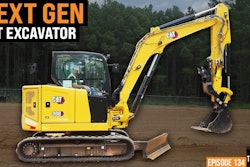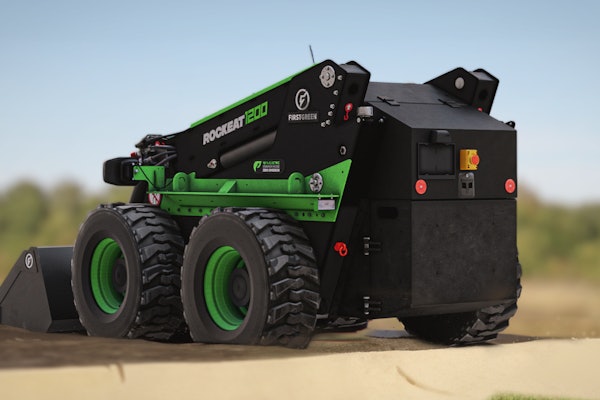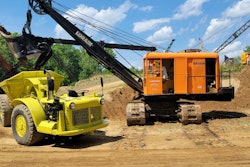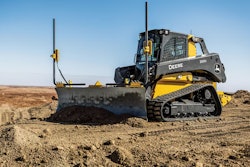Construction equipment owners have likely noticed a trend toward lighter, lower-viscosity oils for diesel engines and are wondering whether they should make the switch.
In this episode of The Dirt, we get to the bottom of why the growth of synthetic low-viscosity oils and whether they are the right choice for your machines. Kevin Carabell, regional technical services specialist at Chevron Lubricants, gives us all the details on the pros and cons of switching to lighter oil.
He also explains the right conditions for making the switch and what you need to know before taking the plunge.
So to find out if it’s time to make the switch to low-viscosity oil, check out this episode of The Dirt.
Equipment World serves up weekly videos on the latest in construction equipment, work trucks and pickup trucks – everything contractors need to get their work done. Subscribe and visit us at equipmentworld.com!
In This Episode:
- 00:00 - Lower Viscosity Oils
- 00:42 - Is it Safe to Use Lower Viscosity Oils?
- 02:59 - Should I Use Lower Viscosity Oil in Old Equipment?
- 04:35 - Why Use Lower Viscosity Oil?
- 09:50 - What is a Synthetic Oil?
- 11:50 - Why You Should Switch to Lower Viscosity Oil
Bryan Furnace (00:00):
Today we're here to talk about lower viscosity oils. If you may have noticed on your shelves at your local auto parts store, possibly from your oil supplier. We're starting to see a lot more. 10W-30s for diesel engines, not for gas engines. Why is that and why should we consider switching to something new? And we've all been comfortable with 15W-40s this whole time Here. To help us today is Kevin Carabell with Chevron, and he's going to give us a little insight as to what this all means and why we should consider the switch.
(00:42):
So my first question for you is, in our industry where we're familiar with diesel engines, there's not a whole lot of gas engines on our side of the business. We've always been under the impression that the higher viscosity oils are that way because that's what keeps the oil film on our equipment as it's really being put through the paces. Yet the industry seems to be moving towards lower viscosity oils. How can we be confident in the field that these lower viscosity oils are going to cover the equipment and protect it like we've expected with the higher viscosity oils?
Kevin Carabell (01:16):
Well, yeah, you're absolutely right. There's been a trend in the last few years to go to lower viscosity oils. And the grade in particular that's become a lot more common is SAE 10W-30. The reason that we had the 15-40 back in the day for the older equipment, and when I say older, I'm thinking 2010 is maybe a good point to kind of have a rough dividing line sort of stuff. Older than 2010, you probably want to think 15-40 stuff. Newer than 2010, you should start thinking maybe 10-30, because some benefits that I'll get into why you would want to do that. And of course you're going to want to check your owner's manual because that's going to be the ultimate decision point there. But you're looking at older equipment that was engineered four 15W-40, and the viscosity is set to a certain point so that there's an oil film that keeps parts separated.
(02:13):
So we don't have wear, it's just sort of the basics of lubrication. And all of that older equipment was engineered and designed for 15W-40. Since about 2010, particularly for on-road equipment, for trucks that are long haul and even local short haul. Many of the manufacturers, Daimler, Cummins, Mack, Volvo have been recommending for those units that they use SAE 10W-30. So the engineering's improved. They've designed in a 10W-30 viscosity grade for those engines and they'll run just fine on it and they're built for it. So you should check your owner's manual. But yeah, the world's changed a little bit in the last 15 years.
Bryan Furnace (02:59):
You kind of lead me into my next question is on newer equipment I can understand because it's being engineered for these lower viscosity oils, but with my older equipment, when should I be concerned or should I even be concerned about throwing a 10W-30 in my equipment that's 15, 20 years old? Is it going to be okay? Do I need to worry about some maybe side issues that they didn't anticipate on the engineering side?
Kevin Carabell (03:24):
For sure, there are applications off-road in particular for your space. I would say mining heavy equipment that's getting a lot of use, particularly in very hot conditions. You're going to want to probably stay with 15W-40 people are in. They don't want to run an experiment and then find out it didn't work, right? So I don't want to counsel somebody to do something that's going to cause them an issue.
(03:49):
But this is why I want to go back to the owner's manual because the engineers that designed those engines have the expertise, they field test it, they know what that equipment needs from a lubrication standpoint, and they're going to have that in the owner's manual. So that would be where I would want to look. But newer equipment, I think there are many cases, short haul, lighter duty, off-road equipment. You're going to want to consider this as a seasonal thing too, right? You're going to have a better experience I think in the winter as well with a 10W-30. It's going to be easier to start that equipment. It's going to work just fine under those conditions. So yeah, I'm just trying to sort of crack the door open a little bit, give people the permission. You can check this and look for it because there's some good reasons why you want to do it.
Bryan Furnace (04:35):
Well, that's my next question for you is why bother? If Grandpappy used 15W-40 and his dad used 15W-40 and it served him just fine, why rock the boat in this situation? Why even explore this path?
Kevin Carabell (06:06):
Right, right. Well, let's take a step back and think about it from a perspective of formulating a 10W-30. There are requirements in place today around volatility, and what that means is just how quickly does that oil turn into a vapor in a hot condition? And that directly relates to oil consumption. When you're thinking of a lighter oil from a formulating the oil perspective, you're thinking of lighter base oils and lighter base oils are going to boil off more quickly, and so you'll see higher oil consumption. But the requirements of today for a 12 Noack, that's just sort of the measurement that they use, forces you to have to put in a group three, which is what we would consider a synthetic base oil, to keep that volatility down. This is one of the advantages that you get with a synthetic oil. It will have what we call a higher viscosity index, which is how quickly does the oil change viscosity with temperature, and as a result, it will have a lower volatility.
(07:14):
So to meet that requirement, just to sort of bring this back to a practical application with the 10 thirties of today, you're not going to see the higher oil consumption that you may have seen with 10 thirties from years ago, but you're going to get the benefits of having a synthetic blend. It's just part of the way they have to formulate the oil to meet the requirements. So what kinds of benefits are we talking about for synthetic blends? I was trying to explain the viscosity temperature relationship that comes along with synthetic oils. And what that means is that your viscosity is going to be at the right level. So if it's cold, it's not going to be too thick. If it's hot, it's not going to be too thin. That temperature will of course make oils thinner as it gets hotter and thicker as it gets colder.
(08:01):
But synthetic oils are less likely to do that. They will stay closer to the ideal viscosity. So that's a benefit. So that'll make the equipment run better and that'll make it easier to start and that'll protect the equipment. Synthetic oils also respond better to oxidation inhibitors, so you get improved oxidation performance with synthetic oils. We talked about oil consumption will be better as well. You'll see easier cold starting, and it's going to be small, but it's there. You're going to see around a one to 1.2% fuel economy improvement because the engine doesn't have to work as hard to pump the oil around.
Bryan Furnace (08:40):
So just so I can make sure I understand all this correctly, moving to a lower viscosity oil gives you the benefits you just talked about. It's easier on the motor to start up when it's cold because it's not having to move this super thick oil. It's a lot thinner, it's a lot easier on the starter and all the components. I'm assuming your engine components are actually going to get coated quicker because it's not having to push heavy sludge, if you will, through this motor. It's a much thinner oil.
(09:08):
And then on top of that, you've got a fuel economy savings, and that's really taking care of the lower viscosity side, and that's why we should look into possibly converting to a lower viscosity. But then if I'm understanding you correctly, on the flip side of moving from a conventional oil to a synthetic or a synthetic blend, I'm understanding that correctly you get better protection through the temperature range that the engine operates in, whether it's the cold start all the way to the hottest conditions that engine's going to see, you get more of an even protection from the oil. Is that, am I getting that correct?
Kevin Carabell (09:48):
That's a good way to put it. Yeah, that's a good way to put it. Yeah.
Bryan Furnace (09:49):
So my last question for you is when it comes to synthetics, really, what is a synthetic oil and why are we starting to see the industry move to these synthetic blends over just a conventional oil?
Kevin Carabell (10:01):
Right. Yeah. So synthetics give you those advantages that we just talked about, and they enable, they kind of unlock lower viscosities. If you try to blend these oils with conventional base oils, you're going to have problems with oil consumption. You're not going to get the oil film thickness that you want. You're going to have issues around the oil being at the wrong viscosity for temperature. So one way to think about it is synthetics help to unlock the advantages that going to lower viscosity can give you. You're still getting the wear benefit. We've discussed this before, that you have to pass all the same wear tests for a 10W-30 that you do for a 15-40. There's no free lunch there. The performance has to meet requirements, it has to be the same. What we're hoping that people can realize is that this gives them a financial benefit by using less fuel.
Bryan Furnace (10:55):
And it sounds like to kind of go back to the synthetic versus conventional, it sounds like you're also getting kind of a more uniform protection through that temperature range as well. It's not just the fuel benefits, but it's legitimate additional protection for the engine.
Kevin Carabell (11:11):
It's a performance benefit. You're absolutely right.
Bryan Furnace (11:13):
Yeah. Interesting. Well, Kevin, I appreciate this. This is every time we talk, I learn a little bit more about the oil industry and what you guys are working on and why there's these different options available to me. And so hopefully this gives people some insight as to why they should actually venture outside of their comfort zone on some of these things. And I will say it sounds like it's venturing outside the comfort zone, mostly because we're so trained to think one way, but the testing's all there to prove that we're really not venturing outside of comfort zone. The engine's going to have the protection just like it did with the 1540.
Kevin Carabell (11:47):
Yeah, give it a shot. Give it a shot.
Bryan Furnace (11:50):
Well, thank you again to Kevin and Chevron for coming on the show to explain to us why the industry is moving to these thinner oils and to the lower viscosities. As you can see, there are some real tangible benefits to making the switch. And because the industry has to follow certain standards, all the testing to make sure it works in your engine has already been done. You don't have to be the Guinea pig with your expensive piece of equipment. It's already been proven that all of these oils with the lower viscosities give you the same protection that you get in the higher viscosities. So that being said, as always, I hope this helps you and your business. Thanks for watching, and we'll catch you on the next episode of The Dirt.









